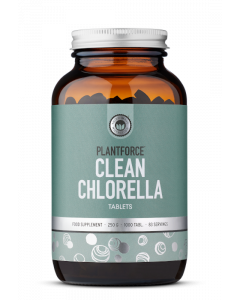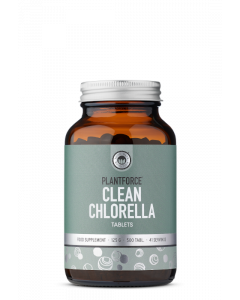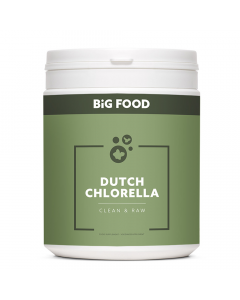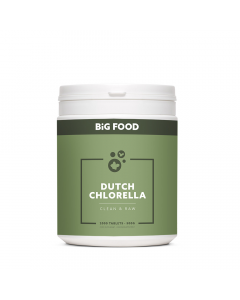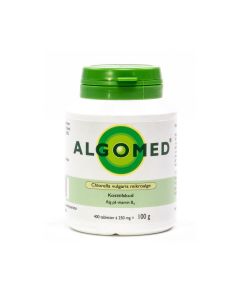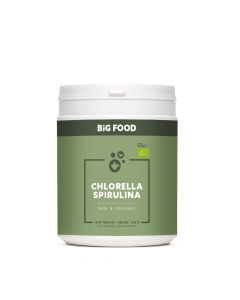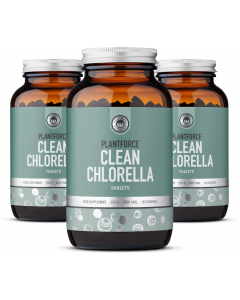-
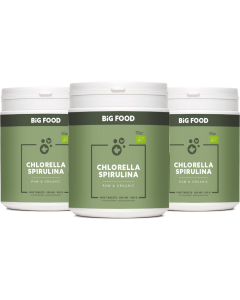 Big Food - Organic Chlorella Spirulina - 500g / 1000 Tablets (500mg) (3 jars deal)Out of stock€ 84.02
Big Food - Organic Chlorella Spirulina - 500g / 1000 Tablets (500mg) (3 jars deal)Out of stock€ 84.02
€ 98.85(Starting at € 84,02 p/u)
- Shipped today!
- Free shipping from € 45
- Postpay possibility
- Review score 9.4
- Earn reward points
- Shipped today!
- Free shipping from € 45
- Postpay possibility
- Review score 9.4
- Earn reward points
- Home
- Superfoods & Mushrooms
- Algae & Greens
- Chlorella

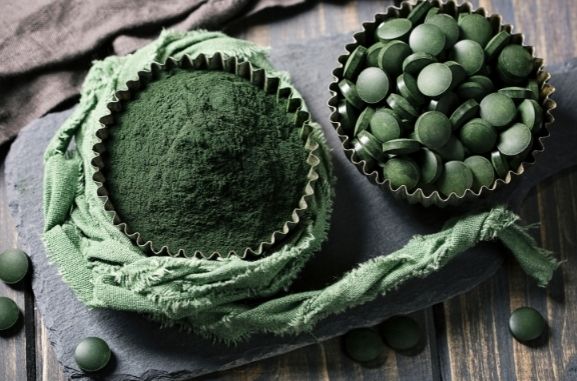
What is Chlorella?
Chlorella, Chlorella Vulgaris, is a single-celled, freshwater alga that originates from the Chlorellaceae family. In recent years, similar to spirulina, chlorella has exploded in popularity as a nutritional supplement, due to its rich and diverse nutritional profile.
Superfood is a term that is often misused nowadays. It should be used only for foods that are rich in a wide variety of nutrients, and so is considered to be ‘especially healthy’. Chlorella is a food that was initially considered as a food alternative to provide sustenance to the rising population demands due to their rich nutrient profile, and have been awarded the label of superfood.
Consisting of approximately 50-60% of protein, the algae superfood also offers sources of key vitamins and minerals, chlorophyll and carotenoids (e.g. lutein). By grinding the superfood algae into a potent powder, the nutritional density of just a single teaspoon can provide you with your daily needs of many of these micronutrients.
- Complete source of protein
- Vitamin B7, B12 & K
- Iron, magnesium and potassium
- Antioxidants
- Chlorophyll
Are Chlorella and Spirulina the same?
No, they are different. Both spirulina and chlorella have exploded in popularity in recent years due to their rich nutritional profile. In fact, both have been given the label of a superfood! However, spirulina and chlorella do originate from different families, or species and with that, there are differences in their nutritional profiles.
Complete protein
Chlorella consists of 50-60% protein, and a 25g serving will provide close to 15 grams! In fact, the algae superfood is known as a complete protein, as it contains the 11 essential amino acids, including leucine (Source: NCBI), that we cannot produce ourselves (Source: NCBI). Of course, because you take it in small doses it is not exactly a natural protein shake. But it all adds up! It is for this reason that Chlorella is often used to supplement vegetarian and vegan diets.
Antioxidants
Chlorella contains a diverse range of powerful plant nutrients, called phytonutrients. These are well known to provide antioxidant effects, detoxifying, and quenching harmful substances that can accumulate in the body (Source: NCBI).
In fact, a recent study showed that chlorella supplementation considerably increased the antioxidant levels in the blood of smokers (Source: NCBI). The most common class of these antioxidative nutrients are known as carotenoids. The algae superfood contains several important carotenoids including lutein, beta-carotene, and zeaxanthin.
Although natural supplements do not rapidly ‘boost’ or ‘ignite’ the immune system, some can provide the raw materials e.g. antioxidants, essential fats, vitamins, and minerals that if consumed on a regular basis, can help to support optimal immune function (Source: NCBI).
Studies have also shown that regular supplementation of spirulina may potentially increase the production of defence cells, and help to prevent the activation of the more aggressive stage of the immune response in the athlete (Source: Taylor & Francis).
Immune Components
When provided with these raw materials, components of the immune system, such as T-cells and NK fighter cells, increase their activity. Chlorella provides an abundance of these materials and has been shown, in early studies, to increase the production of antibodies (Source: NCBI). Regular supplementation of chlorella may also help to reduce the risk and severity of infection in athletes (Source: Springer).
Chlorophyll
Among the many antioxidant compounds found in chlorella, is a pigment known as chlorophyll. In fact, chlorella is one of the richest natural sources of chlorophyll available! This pigment is contained by all plants and is required to produce nutrients through the process of photosynthesis. While humans cannot use it for the same reasons, chlorophyll may help to detoxify harmful substances in the body, skin repair, blood sugar control, and oxygen delivery.
Vitamins
Chlorella is one of only a few plant foods that contain a bioactive source of vitamin B12 (Source: NCBI). This is an essential vitamin, also known as cobalamin, and is usually attained from animal sources, such as meat and dairy. It is critical for nerve function, energy production as well as red blood cell and DNA synthesis.
Minerals
Minerals are essential nutrients that we require in very small amounts, but without them, our bodies would not function. Chlorella provides a source of several key minerals including magnesium, calcium, zinc, iron, potassium, phosphorous, and manganese..

